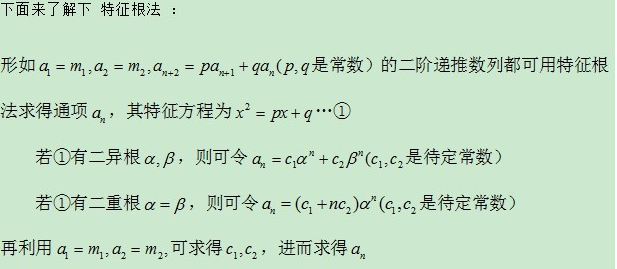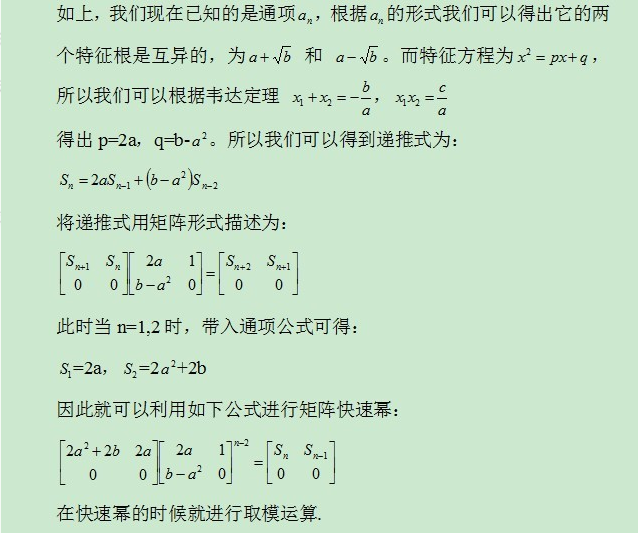题目链接:https://vjudge.net/problem/HDU-4565
So Easy!
Time Limit: 2000/1000 MS (Java/Others) Memory Limit: 32768/32768 K (Java/Others)
Total Submission(s): 5525 Accepted Submission(s): 1841

Where a, b, n, m are positive integers.┌x┐is the ceil of x. For example, ┌3.14┐=4. You are to calculate Sn.
You, a top coder, say: So easy!
题解:
1.因为:0< a,(a-1)2< b < a2,。当a>=1时, a-1<根号b<a,那么 0<(a-根号b)<1;当0<a<1时, 1-a<根号b<a,那么 那么 0<(a-根号b)<2*a-1<1。综上:0<(a-根号b)<1。所以0<(a-根号b)^n<1
2.这里假设b = 根号b,以方便描述。根据上述结论,那么可得:[(a+b)^n] = [(a+b)^n + (a-b)^n] = (a+b)^n + (a-b)^n 。
解释:
2.1 因为a-1<b<1,所以b必定是浮点数,那么(a+b)^n 也必定是浮点数,此时,再加上个大于0小于1的浮点数(a-b)^n,那么 [(a+b)^n + (a-b)^n] 有可能等于[(a+b)^n] ,也有可能等于[(a+b)^n] +1,这就要取决(a+b)^n的小数部分与(a-b)^n的小数部分之和是否大于1。
2.2 此时,就要将(a+b)^n+(a-b)^n展开进行分析。展开后可知,当b的指数为奇数时,正负抵消;当b的指数为偶数时,b^2k 为一个整数。综上:(a+b)^n+(a-b)^n为一个整数,即表明(a+b)^n的小数部分与(a-b)^n的小数部分之和刚好等于1,所以[(a+b)^n] = [(a+b)^n + (a-b)^n] = (a+b)^n + (a-b)^n 。
3.根据上述分析,问题转化为求:S[n] = (a+b)^n + (a-b)^n 。而这个式子可以看成是二阶齐次递推式的通项公式,可以根据通项公式反推回递推式,然后构造矩阵进行求解。具体如下:


以上来自:http://blog.csdn.net/ljd4305/article/details/8987823
代码如下:

1 #include <iostream> 2 #include <cstdio> 3 #include <cstring> 4 #include <algorithm> 5 #include <vector> 6 #include <cmath> 7 #include <queue> 8 #include <stack> 9 #include <map> 10 #include <string> 11 #include <set> 12 using namespace std; 13 typedef long long LL; 14 const int INF = 2e9; 15 const LL LNF = 9e18; 16 //const int MOD = 1e9+7; 17 const int MAXN = 1e6+100; 18 19 int MOD; 20 const int Size = 2; 21 struct MA 22 { 23 LL mat[Size][Size]; 24 void init() 25 { 26 for(int i = 0; i<Size; i++) 27 for(int j = 0; j<Size; j++) 28 mat[i][j] = (i==j); 29 } 30 }; 31 32 MA mul(MA x, MA y) 33 { 34 MA ret; 35 memset(ret.mat, 0, sizeof(ret.mat)); 36 for(int i = 0; i<Size; i++) 37 for(int j = 0; j<Size; j++) 38 for(int k = 0; k<Size; k++) 39 ret.mat[i][j] += 1LL*x.mat[i][k]*y.mat[k][j]%MOD, ret.mat[i][j] = (ret.mat[i][j]%MOD+MOD)%MOD; 40 return ret; 41 } 42 43 MA qpow(MA x, LL y) 44 { 45 MA s; 46 s.init(); 47 while(y) 48 { 49 if(y&1) s = mul(s, x); 50 x = mul(x, x); 51 y >>= 1; 52 } 53 return s; 54 } 55 56 57 int main() 58 { 59 LL a, b, n, m, f[2]; 60 while(scanf("%lld%lld%lld%lld", &a,&b,&n,&m)!=EOF) 61 { 62 MOD = (int)m; 63 f[0] = 2; f[1] = 2*a; 64 if(n<=1) 65 { 66 printf("%lld ", f[n]%MOD); 67 continue; 68 } 69 70 MA s; 71 memset(s.mat, 0, sizeof(s.mat)); 72 s.mat[0][0] = 2*a; s.mat[0][1] = b-a*a; 73 s.mat[1][0] = 1; s.mat[1][1] = 0; 74 75 s = qpow(s, n-1); 76 LL ans = (1LL*s.mat[0][0]*f[1]%MOD+1LL*s.mat[0][1]*f[0]%MOD+2*MOD)%MOD; 77 printf("%lld ", ans); 78 } 79 }
